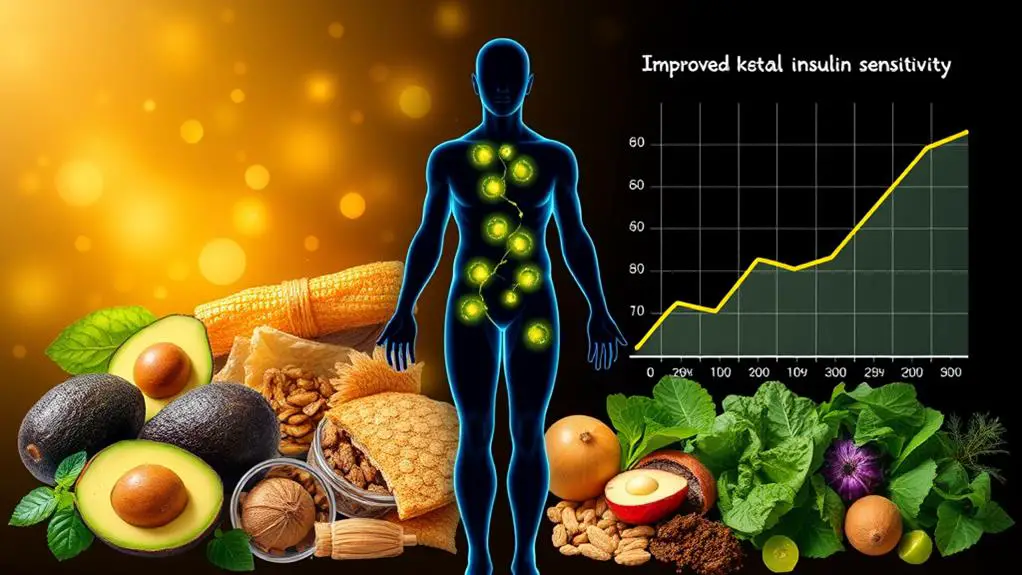
The keto diet is amazing for several reasons, backed by science! It helps shed pounds quickly and reduces hunger, making it easier to stick with. You lose harmful belly fat and keep your muscle, which is awesome. It also stabilizes your blood sugar and insulin, making it a superhero diet for people with diabetes. Your heart health gets a boost too, with better cholesterol, lower blood pressure, and reduced inflammation. Plus, your brain loves ketones, leading to sharper focus and less brain fog. Imagine having more energy for exercise and clearer skin to boot! Want to dig deeper into these benefits?
Key Takeaways
- Promotes significant weight loss, with dieters losing up to 12% body weight over the long term.
- Reduces blood sugar and insulin levels, aiding in diabetes management and lowering HbA1c by nearly 10%.
- Increases HDL cholesterol by 15-30%, improving heart health and reducing cardiovascular risks.
- Enhances cognitive performance and provides mental clarity through steady energy via ketones.
- Decreases inflammation markers like C-reactive protein, reducing oxidative stress and benefiting chronic conditions.
Effective Weight Loss
The ketogenic diet, known for its high-fat, low-carbohydrate regimen, has been shown to facilitate effective weight loss by drastically reducing calorie intake and curbing appetite. This diet shifts the body's metabolism, leading to enhanced metabolic flexibility. Instead of using carbohydrates for energy, the body burns stored fat, a process called ketosis.
Studies show that people on a keto diet can lose up to 12% of their body weight over the long term. That's a big deal! One meta-analysis found that keto dieters lost 5 pounds more than those on low-fat diets after just six months. Talk about impressive results!
The diet doesn't just help you lose weight; it also improves body composition by reducing visceral fat, which is the dangerous fat around your organs.
For example, people on very low-calorie ketogenic diets (VLCKD) saw three times more visceral fat loss compared to those on traditional low-fat diets. Plus, the shift to using stored fat for energy helps decrease waist circumference and markedly reduces weight in obese individuals.
Imagine fitting into those old jeans again! With these benefits, it's clear why the keto diet is gaining so much popularity.
Enhanced Appetite Control
One of the biggest perks of the keto diet is how it helps control your appetite.
By encouraging your body to produce ketones, the keto diet regulates hunger hormones like ghrelin and boosts levels of peptide YY (PYY), which makes you feel full.
As a result, many people naturally eat less, helping them manage their weight without feeling constantly hungry.
Hormonal Appetite Reduction
A primary benefit of the ketogenic diet is its role in hormonal appetite reduction, which greatly enhances appetite control. By promoting hormonal balance, this diet can effectively manage appetite regulation. One of the key mechanisms behind this benefit is the significant reduction in ghrelin, often referred to as the "hunger hormone." Lower ghrelin levels help individuals feel less hungry, making it easier to consume fewer calories.
Studies have shown that participants on a ketogenic diet can experience a 20-30% decrease in hunger levels compared to those on higher carbohydrate diets. This is partly due to the increased intake of protein and fats, which are more satiating than carbohydrates.
Feeling full with fewer calories reduces the frequency of snacking and helps maintain a steady energy level throughout the day.
Additionally, research indicates that the appetite-suppressing effects of the ketogenic diet can lead to spontaneous calorie reduction. This means individuals can achieve their weight loss goals without the need for restrictive dieting, making the journey more manageable and less stressful.
Increased Satiety Signals
Building on the hormonal appetite reduction benefits, increased satiety signals play a pivotal role in the ketogenic diet's effectiveness. By promoting a higher intake of fats and proteins, which are more filling than carbs, the keto diet helps you feel full longer. This means you naturally eat less, without feeling deprived. Cool, right?
Research shows that people on keto diets have lower hunger levels and decreased amounts of ghrelin, the hormone that makes you feel hungry, compared to those on high-carb diets. Imagine not feeling the need to snack all the time.
A meta-analysis found that folks on low-carb and keto diets ate fewer calories daily, without having to count every bite. That sounds like a win!
What's even more impressive? The keto diet can lead to lasting changes in how your body regulates appetite. Many people manage to keep the weight off because they feel fuller and have fewer cravings.
Plus, stabilizing blood sugar levels helps avoid those nasty spikes and crashes that make you hungry, reducing the urge to snack.
Targeted Fat Reduction
Targeted fat reduction is a significant benefit of the ketogenic diet, particularly in addressing visceral fat, which is closely linked to increased risks of heart disease and metabolic disorders.
One of the key highlights of the keto diet is its ability to promote metabolic adaptation, where your body shifts from burning carbohydrates to utilizing fat stores for energy. This process, known as ketosis, leads to efficient fat oxidation and significant fat loss, especially in the abdominal area.
Research shows that individuals on ketogenic diets experience a noticeable reduction in waist circumference and overall body fat percentages. For instance, one study highlighted an average fat loss of around 12% over a sustained period.
Additionally, a meta-analysis found that people following low-carbohydrate diets, including keto, lost 5-10% more body fat than those on traditional low-fat diets over six months.
What's even more impressive is that the keto diet helps you shed fat without losing muscle mass. Long-term adherence to ketogenic diets has been shown to preserve lean body mass, making it an effective tool for achieving a healthier body composition.
To summarize, the keto diet stands out for its targeted approach to reducing harmful visceral fat.
Improved Blood Sugar Levels
One of the amazing benefits of the keto diet is its power to improve blood sugar levels.
By reducing carbohydrate intake, this diet helps keep insulin levels low and blood glucose stable, making life easier for people with diabetes.
Studies even show that many type 2 diabetes patients can cut down or stop their medications, which sounds like a win to us!
Lower Insulin Levels
The ketogenic diet, known for its low carbohydrate and high fat intake, has been shown to considerably lower insulin levels, providing substantial improvements in blood sugar control. By reducing insulin resistance and enhancing metabolic flexibility, the keto diet enables the body to better manage glucose levels.
Studies have demonstrated that fasting insulin levels can drop by up to 75% within just a few weeks of starting the diet.
For individuals with Type 2 diabetes, this can be transformative. Research indicates that around 95% of patients can reduce or even eliminate their medication needs when they adhere to a ketogenic diet. This dietary approach leads to significant reductions in HbA1c levels, nearly 10%, which is essential in managing diabetes and preventing complications.
The shift to low carbohydrate intake forces the body to utilize fat for fuel, promoting more stable blood sugar levels and reducing the risk of insulin spikes. This metabolic shift not only helps control blood glucose but also reduces the likelihood of developing metabolic syndrome.
A meta-analysis further supports these findings, showing that people on ketogenic diets experience greater decreases in blood glucose levels compared to those on low-fat diets, therefore enhancing overall glycemic control.
Stabilized Blood Glucose
A key advantage of the ketogenic diet is its ability to stabilize blood glucose levels, which is particularly beneficial for individuals with diabetes. This diet can notably help manage blood sugar fluctuations and improve glucose metabolism.
Research shows several important benefits:
- Lower HbA1c Levels: The ketogenic diet has been shown to lower HbA1c levels by nearly 10%, which is essential for long-term blood sugar control in diabetes patients.
- Improved Insulin Sensitivity: Individuals on a ketogenic diet experience considerably lower blood glucose levels, improving insulin sensitivity for both Type 1 and Type 2 diabetes patients.
- Reduced Fasting Blood Sugar: A meta-analysis found that keto dieters had an average reduction in fasting blood sugar levels, leading to better management of metabolic syndrome symptoms.
- Minimized Insulin Spikes: The diet's low carbohydrate intake helps stabilize blood glucose levels by minimizing insulin spikes and promoting fat as the primary energy source.
Additionally, clinical studies have demonstrated that up to 95% of type 2 diabetes patients on a ketogenic diet can reduce or eliminate their need for diabetes medications.
This showcases the diet's effectiveness in managing blood sugar levels and improving overall health. The keto diet offers a promising approach for those looking to gain better control over their glucose levels and enhance their quality of life.
Better Insulin Sensitivity

Numerous studies have demonstrated that adopting a ketogenic diet can greatly enhance insulin sensitivity, a critical factor in managing Type 2 diabetes. When people follow a keto diet, they adhere to reducing their carbohydrate intake considerably, which in turn stabilizes insulin mechanisms. This stability results in fewer insulin spikes, helping to maintain more consistent blood sugar levels.
Research shows that individuals with Type 2 diabetes who switch to a keto diet often experience a remarkable improvement in insulin sensitivity. For instance, HbA1c levels, a key marker for long-term blood sugar control, can decrease by nearly 10%. That's a big deal! A meta-analysis even found that people on keto diets had lower insulin levels compared to those on traditional low-fat diets, underscoring the diet's effectiveness.
Moreover, the keto diet's ability to reduce body fat, especially that pesky visceral fat, plays a considerable role in enhancing insulin sensitivity. Visceral fat is a troublemaker when it comes to insulin resistance.
Increased HDL Cholesterol
Adopting a ketogenic diet is associated with a notable rise in HDL (high-density lipoprotein) cholesterol levels, often hailed as the "good" cholesterol due to its role in cardiovascular health.
HDL cholesterol plays an essential role in cholesterol transport, helping to remove bad cholesterol from your bloodstream and ferrying it to the liver for excretion. This function is critical for maintaining a healthy heart.
Research indicates that following a ketogenic diet can lead to an increase in HDL cholesterol levels by 15-30%, improving cardiovascular health markers.
A meta-analysis has shown that individuals on low-carb, high-fat diets experienced considerably higher HDL cholesterol levels compared to those on traditional low-fat diets. This boost in HDL is often attributed to the high intake of healthy fats such as those found in avocados, nuts, and olive oil.
Higher HDL cholesterol levels are correlated with a lower risk of heart disease.
Here's why increasing HDL cholesterol is beneficial:
- Enhances cholesterol transport by removing bad cholesterol from the bloodstream.
- Reduces the risk of heart disease by improving cardiovascular health markers.
- Supports arterial health by preventing plaque buildup.
- Promotes liver function by facilitating cholesterol excretion.
Lower Blood Pressure

Following a ketogenic diet has been linked to significant reductions in blood pressure, with studies showing decreases of approximately 4-10 mmHg in both systolic and diastolic readings within a few weeks of adherence. This is pretty exciting news, especially for people looking for natural ways to manage their blood pressure.
The secret lies in the blood pressure mechanisms triggered by keto's unique dietary adjustments.
When you follow a keto diet, your insulin levels drop, and your body becomes better at using insulin. This can make your blood vessels work more efficiently and reduce stiffness in your arteries. Imagine your arteries as flexible straws instead of rigid pipes—that's what better vascular function looks like!
Plus, a meta-analysis of low-carb diets, including keto, shows that these changes can lower your risk of heart disease and stroke.
Losing weight on the keto diet also helps reduce blood pressure. Less weight means your heart doesn't have to work as hard to pump blood.
Boosted Brain Function
In addition to its cardiovascular benefits, the ketogenic diet also offers a remarkable boost to brain function. This low-carb, high-fat diet provides a steady energy source in the form of ketones, which can enhance cognitive performance and mental clarity. Imagine your brain operating on premium fuel, always ready to tackle tasks and solve problems with ease.
Research reveals that ketones, particularly beta-hydroxybutyrate (BHB), may increase levels of GABA, a neurotransmitter that promotes relaxation, leading to significant anxiety reduction. It's like having a built-in stress-buster, helping you stay calm and focused. Some studies even suggest that the ketogenic diet's impact on anxiety is comparable to mood-stabilizing medications.
Additionally, ketosis has shown neuroprotective properties, potentially benefiting those with neurological conditions like Alzheimer's and Parkinson's disease. This means that the ketogenic diet not only boosts day-to-day brain function but may also offer long-term protection against cognitive decline.
Here are some key benefits of the ketogenic diet for brain function:
- Cognitive enhancement: Improved mental clarity and performance.
- Anxiety reduction: Increased GABA production for better relaxation.
- Neuroprotection: Potential benefits for Alzheimer's and Parkinson's patients.
- Memory improvement: Promising results for age-related cognitive decline.
Reduced Inflammation

The ketogenic diet has garnered attention for its significant role in reducing inflammation within the body. This diet is linked to lower levels of pro-inflammatory cytokines, which are key players in the body's immune response. Imagine your immune system as a fire department; cytokines are the alarms that call the firefighters. When there are fewer alarms, there's less chaos and more order.
Ketone metabolism also helps by reducing the production of reactive oxygen species—those pesky molecules that can cause oxidative stress and inflammation, like tiny sparks that can ignite a fire. Research even shows that people on a ketogenic diet have lower levels of inflammatory markers like C-reactive protein (CRP). Think of CRP as a red flag for inflammation; fewer red flags mean a healthier you!
Stabilizing blood sugar levels is another trick up the keto diet's sleeve. When your blood sugar is steady, your body doesn't send out emergency signals that can lead to inflammation. This is especially beneficial for people with chronic conditions like type 2 diabetes, where inflammation is a frequent, unwelcome guest.
In short, the ketogenic diet doesn't just help you shed pounds; it also helps keep the body's inflammation in check, making life a lot more comfortable.
Improved Heart Health
Regarding cardiovascular well-being, the ketogenic diet emerges as a promising contender. This high-fat, low-carb eating plan isn't just about weight loss; it also boasts impressive benefits for cholesterol management and cardiovascular wellness.
First off, the keto diet has been shown to notably lower total cholesterol and LDL levels. These are the bad guys when it comes to heart disease, so getting them down is a big win. Plus, many people on keto see a nice bump in their HDL, or good cholesterol, which is always welcome.
Let's break it down:
- Lower total cholesterol and LDL levels: These are big risk factors for heart disease.
- Boost in HDL levels: More good cholesterol is always a plus.
- Improved triglyceride levels: Many people on keto see these drop, which helps overall heart health.
- Better blood pressure control: Lowering blood pressure reduces the risk of heart conditions.
Research backs this up, showing that low-carb diets, including keto, reduce markers of cardiovascular risk more effectively than traditional low-fat diets.
Plus, the anti-inflammatory effects of keto might help decrease systemic inflammation, which is linked to heart disease.
Frequently Asked Questions
Are There Any Health Benefits to Keto?
Yes, the ketogenic diet offers numerous health benefits including keto weight loss, improved keto blood sugar control, enhanced keto mental clarity, better keto heart health, reduced keto inflammation, increased keto nutrient density, improved keto digestive health, boosted keto athletic performance, enhanced keto longevity, and balanced keto hormone levels.
What Do Scientists Say About Keto Diet?
Scientific studies reveal that while the keto diet offers benefits such as weight loss and improved glycemic control, there are several keto misconceptions. Researchers emphasize the need for long-term studies to fully understand its broader health impacts.
Who Benefits the Most From Keto Diet?
Individuals benefiting the most from the keto diet include those seeking weight loss, improved metabolic health, enhanced cognitive function, increased insulin sensitivity, better heart health, optimized athletic performance, balanced hormones, controlled appetite, and improved digestive health.
What Do Doctors Say About a Keto Diet?
Doctors acknowledge the keto diet's efficacy in weight loss and metabolic improvements but caution against keto misconceptions. They emphasize the importance of personalized plans, regular monitoring, and moving to a balanced diet, aligning with professional doctor recommendations.
Conclusion
To summarize, the keto diet offers numerous health benefits backed by research. It promotes effective weight loss, enhances appetite control, and targets fat reduction. Additionally, it improves blood sugar levels and insulin sensitivity, lowers blood pressure, and boosts brain function. The diet also reduces inflammation and supports heart health. These advantages make the keto diet a valuable option for those seeking to improve overall well-being through dietary changes.










No Comments